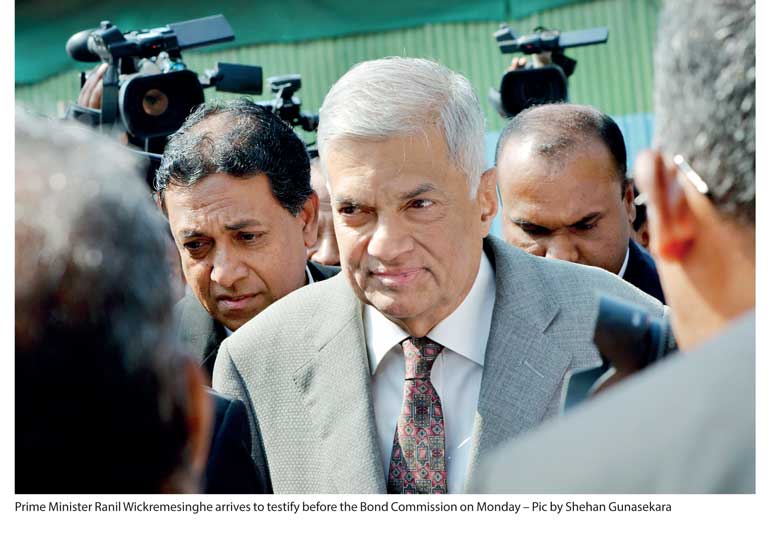Saturday Feb 14, 2026
Saturday Feb 14, 2026
Wednesday, 22 November 2017 00:00 - - {{hitsCtrl.values.hits}}
 Twenty years ago in 1998, Dr. Jayadeva Uyangoda writing in the periodical ‘Frontline’ traced our peculiar path of progress in the 50 years of independence. In about 40 days we will reach the 70th year of independence as a post-colonial nation state.
Twenty years ago in 1998, Dr. Jayadeva Uyangoda writing in the periodical ‘Frontline’ traced our peculiar path of progress in the 50 years of independence. In about 40 days we will reach the 70th year of independence as a post-colonial nation state.
The adjective ‘modern ‘is evaded for good reason. We are frozen in history. We elected a peasant in place of an autocrat who thrived in the patrimonial state. Yet Ranil’s style of governance bent on preserving a primitivity that dating back to pre-independence times, poignantly captured in the lyrics of the song ‘Master Sir, Mata Himi Thena Denna.’
Sagala Ratnayake, Minister of Law and Order, switches off his mobile phone for an afternoon snooze in his manorial refuge in the deep south. The President wants to reach him for an update on a recent rumpus also in the  south and instructs an aide to link him with Sagala by phone. The Presidential aide discovers the Minister’s mobile muted and calls the residence.
south and instructs an aide to link him with Sagala by phone. The Presidential aide discovers the Minister’s mobile muted and calls the residence.
Sagala’s major domo informs the senior Presidential aide that waking his master in repose was unthinkable. “Hamu Mahaththya nidi. Aharunama kiyannan” (Master is asleep, will tell him when he is awake) was the response that the Presidential aide heard in tone clearly conveying its finality.
While the UNP ruling class is cocooned in feudal hierarchical primitivity, 21st century household servants are not dumb. The domestic aide’s refusal to wake up Sagala was dictated by a subconscious sharing of his master’s world view. He would have heard countless conversations between Sagala Hamu and Ranil Hamu that would have formed the frame of reference to the ‘Janadhipathithuma’ who in his opinion was another ‘Gamarala’ who could damn well wait till ‘Sagala’ Hamu wakes up.
Where are we today, a day after a Prime Minister for the first time in 70 years of our parliamentary democracy appeared before a commission of inquiry to explain his Prime Ministerial decisions? He is at great pains to explain that it was voluntary, and the purpose was to clarify events, circumstances and decisions.
In the humble view of this writer, Prime Minister Ranil Wickremesinghe is also the first Prime Minister of Sri Lanka who by a sworn affidavit has contradicted himself in the Hansard, the official record of parliamentary proceedings.
The answer to the question ‘Where are we today?’ requires retracing our tracks in the last 70 years. There is no point in reinventing the wheel.
Dr. Uyangoda has disassembled and reassembled our first 50 years in elegant prose and a pitiless probity. “…in a political and historical sense my own biography of the past 48 years has been closely intertwined with the 50-year biography of post-colonial Sri Lanka. I grew up in the early 1950s in the relative peace of an isolated Sinhalese village. As a six-year-old child, I learnt about the assassination of Prime Minister S.W.R.D. Bandaranaike, and political assassinations were to constitute a major facet of my country’s politics since I reached the age of 38. As an eight-year-old child, I learnt about the differences between the Sinhalese and Tamil communities; then, of course, even the everyday events of my entire adult life were to be governed by Sinhala-Tamil conflictual politics. I came of age in the radical 1960s while being fed, looked after and educated by one of the best welfare states in the developing world. The welfare state, which also stood as an obstacle to significant economic growth, produced from among its own children a generation of bewildered idealists. Being one among them I ran away from home, became a modern anarchist, tried my hand at revolution and along with my generation paid a heavy price for that misadventure. Then in the twilight of my youth, in the 1980s, I witnessed how my country all of a sudden began to lose all its idealism and hope while aggression, hostility, ethnic self-righteousness, brutality and violence were welcomed with fervour by all those who mattered in shaping Sri Lanka’s political future. At present I am watching, not with pleasure, how Sri Lanka is running deeper and deeper into its decades-old crisis. In despair, I read the poetry of despair. As I recently read in a poem by Pakistan’s Kishwar Naheed, ‘I and my country were born together – We lost our sight in childhood.’” http://www.frontline.in/static/html/fl1505/15050620.htm
Ranil Wickremesinghe, Chandrika Kumaratunge and Mahinda Rajapaksa collectively epitomise the folly of the next 20 years from 1998 to 2018.
Chandrika is history. Mahinda dislodged from the saddle is fiercely clutching on to a part of the harness. The horse is restless. The purpose of this essay is to assess how long Ranil will remain on the saddle. In a previous essay 48 hours before, this writer noted that, “No matter how Prime Minister Ranil Wickremesinghe’s encounter with the Commission turns out, its final outcome will be monumental and transformational.”
Reading the details of his affidavit submitted to the commission published in the Island newspaper and the detailed report of yesterday’s proceedings carried in the Daily Mirror makes it abundantly clear that he is not just injured but fatally wounded. The question is how he will survive on his saddle but how long?
Ranil bashing is today a fashionable pastime among commentators. This writer is not one of them. His earlier prime ministerial tenure was a positive path to progress economic and political. We knew Prabhakaran to be a ferocious beast. Given the magnitude of the carnage and the precious years forfeited in an unending conflict, this writer admired the courage of Ranil Wickremesinghe to sign a Cease Fire Agreement with the LTTE and explore a negotiated settlement. A more powerful executive President made some noise but did not repudiate the shaky peace that followed.
The war-winning redeemer of the Sinhala nation who by then was already anointed ‘Sri Rohana Janaranjana’ by the monastic order in Kandy did not critique the agreement and retained for more than two years continuing the dialogue under his presidency. In the presidential elections of 2005 Ranil lost by a whisker. Anyone claiming that the Sinhala people opposed the CFA is a classic parvenu and a charlatan. Ranil polled 48.43 % against Mahinda’s 50.29%. That was when Sinhala soldiers fought the war. ‘Ranaviru’ warriors emerged a few months before General Fonseka went to jail.
In an article published in the Daily Mirror of 20 October 2005 this writer condemned the protean politics of Mahinda and endorsed the decisive politics of Ranil.
The man changed after May 2009 and embarked on collusive politics with the autocrat Mahinda who was now Janaranjan not only of Sri Rohana but the entirety of the Thrisinhala.
Since 8 January 2015, he has bonded with oligarchs who thrived under Mahinda Rajapaksa. Under Mahinda, the sister of the Central Bank Governor accessed the nation’s largest pension fund. Ranil made it simpler. He appointed a Governor whose son-in-law lived with him, shared WhatsApp and Viber with him to do it.
The Prime Minister informs the commission in his affidavit: “Mr. Mahendran was selected for appointment in view of his professional qualifications and experience in the field of banking and investments. He had functioned as the Chairman of the BOI during the period 2002 to 2004. He had also held senior positions in the banking industry in Middle East and Singapore. The previous incumbent lacked comparable qualifications and experience and the administration of the CBSL during his tenure of his office had been the subject of severe criticism. Hence, prior to the general election of 2015 there was a general demand from our political allies that a competent person versatile in banking and International finance should be appointed to the post of Governor of the CBSL.”
During his voluntary clarifications he is told: “Now these are the clarifications we need. The first one is where you aware about the holding companies of PTL were Perpetual Capital Holding Ltd. and Perpetual Capital Ltd.?” Prime Minister Ranil Wickremasinghe tells the commission: “No, I was not aware about the holding structure of those companies.”
In the affidavit the Prime Minster affirms: “Upon the formation of the new Government in January 2015 there was a general consensus within the Government that Mr. Mahendran should be appointed to the post of Governor of CBSL. I discussed the proposed appointment with the then Minister of Finance who agreed that Mr. Mahendran was the most suitable candidate. Accordingly, the then Minister of Finance with my concurrence recommended to His Excellency the President that Mr. Mahendran should be appointed. His Excellency the President acting upon the said recommendation appointed Mr. Arjuna Mahendran as the Governor of the CBSL.”
Protocol required the mild-mannered Attorney General to lead the clarifications of the Prime Minister. He was not asked if the general consensus of the Government on the outstanding suitability of Arjun Mahendran to be governor was shared by Dr. Sarath Amungama who was then a Cabinet Minister with extensive experience in dealing with multilateral financial institutions and specifically the International Monetary Fund.
Emerging after his clarifications he assured everybody that all clarifications were provided. “We may have made some mistakes. We will correct them and go forward. We will continue the Yahapalanaya.”
In the 40 years of public life, Monday was the first time that Ranil Wickremesinghe conceded that thin trace of fallibility.
Mark Twain was right. God made a mistake by forbidding the apple. He should have forbidden the serpent. Then Adam would have eaten the serpent and spared the apple.